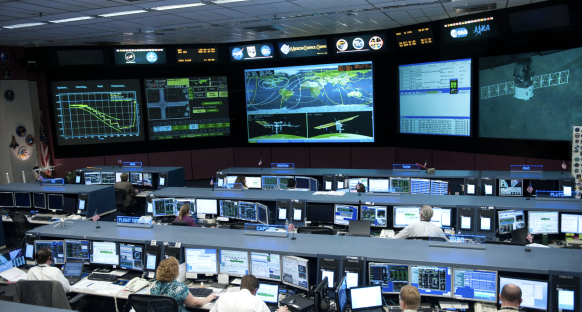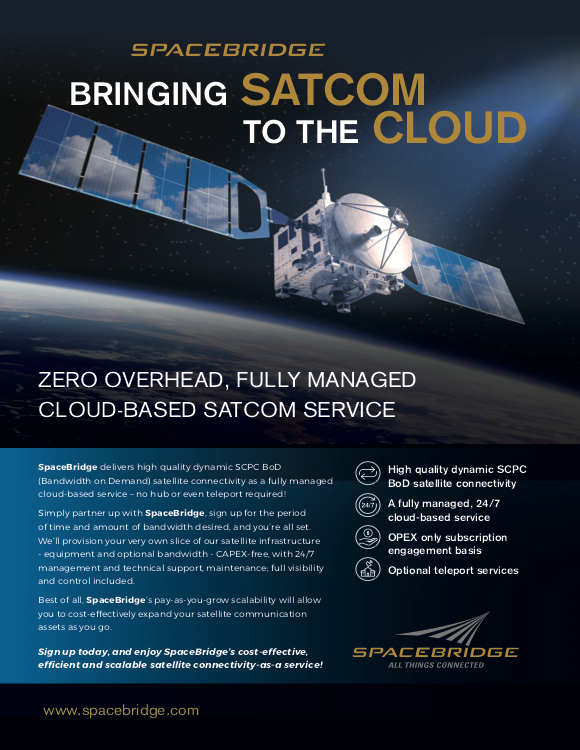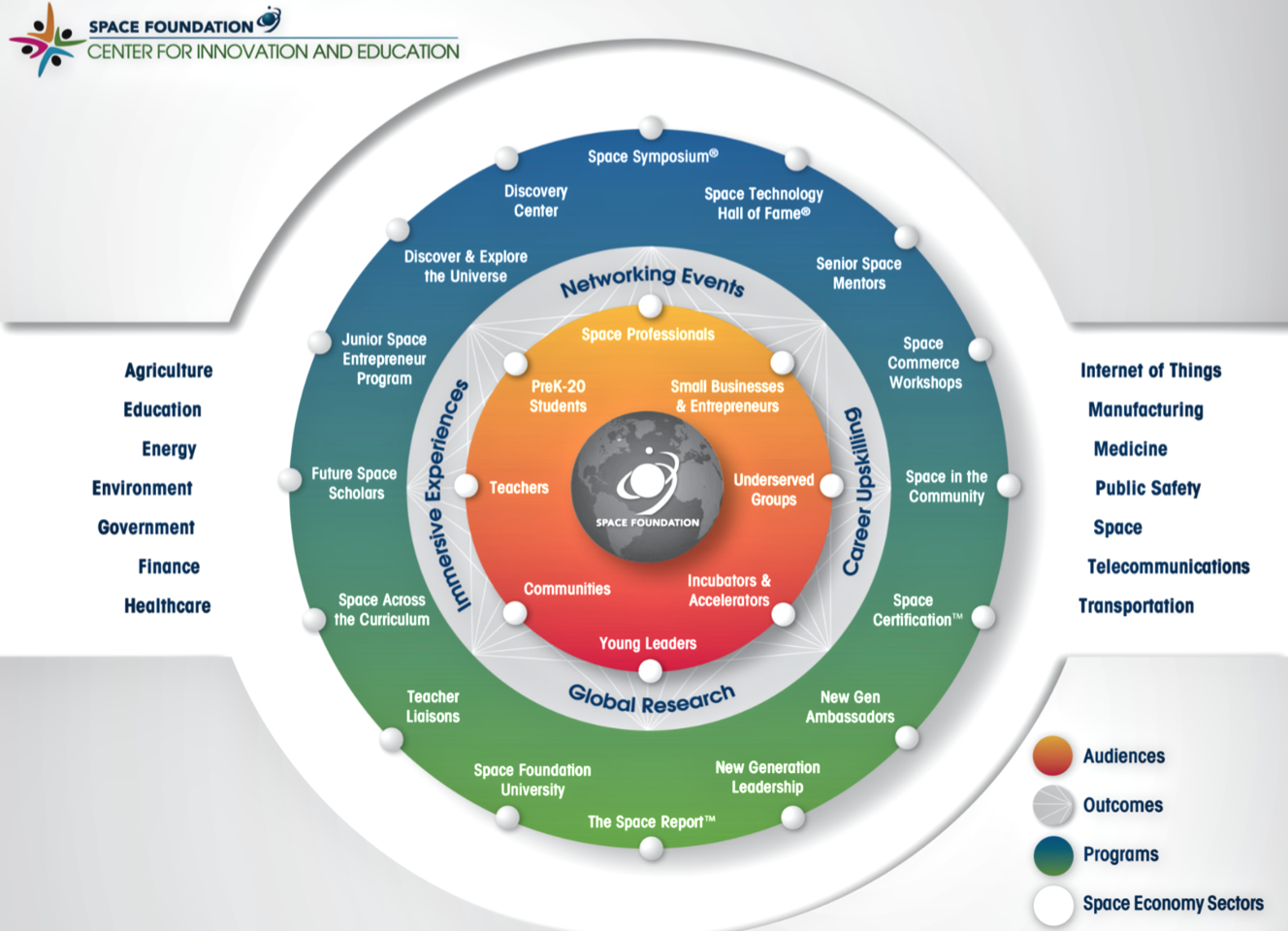Space — once considered the final frontier and only accessible to a select few — is now home to the most dynamic and innovative economy on the planet.
Today, every community, infrastructure, and aspect of modern life is either acutely dependent on or indirectly affected by space-related technologies. These innovations span all industries, including health and medicine, transportation, public safety, consumer goods, industrial productivity, information technology, energy, environment and more, impacting societies and regions across the globe.

Space technology also plays an essential role in the global economy. With more than 80 nations operating in space, this is a $415 billion economy — estimated to be a $1-3 trillion market within the next 20 years — and is a frontier of opportunity for all people.
No longer dependent on government agencies as its sole source of funding and development or limited to a select group of highly skilled scientists and engineers, advancing and commercializing space innovation now thrives through the collaborative work of public and private companies, academia, startups and entrepreneurs. Ongoing space developments will be key to solving the most pressing issues of our time as well as to ensure a healthy, sustainable future.
Opportunity abounds, but it's complicated. Beyond the abundance of possibilities presented by collaboration between public organizations, private enterprises, NASA and the Pentagon, the space industry faces a severe workforce shortage as well as a significant skills deficit.
Statistics and analysis from the U.S. Department of Labor’s Bureau of Labor Statistics (BLS), the Commerce Department’s Bureau of Economic Analysis (BEA), the U.S. Census Bureau, the Organisation for Economic Co-operation and Development (OECD), and the American Action Forum all forecast significant shortages in workers and needed skills.
These factors are expected to contribute to a space technology innovation gap. Without manpower — laborers to entrepreneurs to STEM experts — and continual career upskilling to enable the commercialization of space technology innovations, the full potential of the space economy for the betterment of humanity will not be realized.
No Better Time to Be a Part of the Space Economy
With unemployment reaching millions and growing, there now exists a viable pipeline of workers who could fill the opportunities available in today’s professional workforce. The space economy needs candidates representing all demographics and skill sets, from laborers to scientists. Whether dictated by job loss or shelter-in-place orders, workers are spending more time at home, presenting a window of opportunity for gaining awareness, knowledge and training to prepare for space-related jobs.

For the next-generation workforce, the pandemic forced millions of students home from school, offering another window of opportunity to inspire future space workers and instill a culture of lifelong learning through multimodal and blended learning platforms that can serve as effective training, starting as students and spanning an individual’s entire career.

“Every person on planet Earth can find a place in the space economy, regardless of the present state of the job market," said Tom Zelibor, CEO of the Space Foundation. “The space industry has remained one of the most resilient business sectors throughout the COVID-19 crisis. With 80 percent of business coming from public and private enterprise, and ample time for building awareness and skills, a rare opportunity exists to solve the workforce shortage and drive innovation forward in the space economy.”
So, how is the Space Foundation helping to prepare today and tomorrow’s workforce for the space economy?
A Workforce Development Roadmap to the Space Economy
As a global steward and convener of the world’s space community, the Space Foundation introduces its Center for Innovation and Education to enable and expand greater access and opportunity for everyone in today’s space community. Through a comprehensive approach and partnership strategy, the Space Foundation is creating and delivering inclusive, innovative and sustainable workforce development and economic opportunity programs.
As a 501(c)(3) global leader in space advocacy for the last 37 years, the Space Foundation unites and facilitates collaboration across the entire spectrum of stakeholders from the global space community — business, government, education and local communities.
Its Center for Innovation and Education brings these constituencies together through corporate membership, partnership, sponsorship,
fundraising and grants to serve the entire life cycle of the workforce — students, young leaders, entrepreneurs and professionals.
Through its Workforce Development Roadmap, the Center for Innovation and Education details initiatives for building the professional workforce of today as well as the next-generation workforce of tomorrow. The Roadmap follows five core disciplines designed to combat the obstacles standing in the way of building a qualified space workforce:
1. Awareness of space impact and the breadth of workforce opportunities
2. Access to jobs, careers and business ventures for all people
3. Training for lifelong learning of sustainable skills
4. Connections to a vast space network of people, businesses and resources
5. Mentorship of young leaders to be next-generation role models
To learn more about the Center for Innovation and Education, please visit www.spacefoundation.org/cie and register for on-demand access to a complimentary detailed e-book at www.spacefoundation.org/cie-ebook/.
The Center for Innovation and Education at the Space Foundation presents a constellation of workforce development and economic opportunity.
Impact: Entrepreneurship Programs Reveal Early Signs of Success
To date, the Center for Innovation and Education has piloted two successful programs through vital partnerships with public and private enterprises, government agencies, universities and local communities:
Space Commerce Entrepreneurship Program Funded primarily by a grant from the U.S. Department of Commerce’s Minority Business Development Agency, the Space Foundation conducted workshops in nine cities for 275+ minority entrepreneurs and small businesses. Spotlighting the program’s early success, one small business has signed multi-million-dollar deals, and other space scholars are progressing through their first engagements in the space community.
Junior Space Entrepreneur Program (JSEP) Supported by Lockheed Martin, NASA and Junior Achievement, a successful pilot program for 26 teachers from 16 states led to the first student entrepreneur program for 50 public high school students. This program won recognition in the Fast Company 2020 World Changing Ideas award competition.
Call to Action: Corporate Members, Partners, Sponsors and Donors
“The Space Foundation has spent the last 37 years developing and collaborating with the largest global network of space professionals in order to conduct world-class training and research,” said Shelli Brunswick, COO, Space Foundation. “We conceived of the Center for Innovation and Education to take these assets and apply them to build today’s professional workforce and a strong pipeline for the future.”

Space has never been more important. It unites and inspires people around the globe, and the Center for Innovation and Education is committed to helping people find their place in the space economy.
The time is now to introduce core space-inspired education, broaden employment opportunities, and bolster skill-building programs to fuel economic sustainability for generations to come.
To do so, the Space Foundation relies on corporate members, partners, sponsors, donors and grantors to support its efforts in delivering services to the global space community.
“As the pandemic has displaced millions of jobs and sent millions of our future workforce home from school, this mission becomes even more critical,” added Brunswick. “Now is the time for our extensive partner ecosystem to step up and support the programs that will increase knowledge, leverage skills, and enable the workers of both today and tomorrow to become valued contributors to a thriving space industry that dramatically impacts our lives every day.”
Corporate members, partners, sponsors and donors can connect with the Space Foundation to learn more about the impact of their contributions at www.spacefoundation.org/join-us/.



